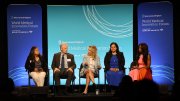In an era of growing political polarization, new research moves beyond typical economic explanations, such as the loss of blue-collar manufacturing jobs, to offer a fresh take on how people make choices in the voting booth. Associate professor of economics Benjamin Enke shows how a “universalist” mindset versus a “particularist” one drives voting behavior.
What do these abstract-sounding terms mean? Universalists apply a firmly held set of moral principles to all people, Enke says, believing that “even if you don’t know somebody, you have to treat them as well as somebody that you have a close connection to.” In contrast, a particularist (who also has a so-called “communal” mindset) “emphasizes that you have some relationship-specific moral obligations,” he explains. “You owe your family, you owe your friends, you owe your compatriots better treatment than people that you have no connection to.”
Enke and his research collaborators have used multiple approaches to identify universalists and particularists and to determine how these mindsets influence voting. For example, they used psychological questionnaires to determine how much respondents valued principles such as loyalty (especially popular among particularists) or caring for the weak (highly valued by universalists). To observe these values in real-world settings, the researchers used a large dataset from a crowd-sourcing platform called DonorsChoose, which enables users to donate money to individual classrooms across the United States, purchasing materials such as art supplies or new computers. DonorsChoose allowed the researchers to see how anonymous benefactors made charitable decisions. “Am I going to give money to the school that’s 50 miles away, in my own state”—a more particularist choice—“or do I give to a school…that is 900 miles away?”—a universalist choice.
They then compared the charitable donations in a given electoral district to its voting results. “It turns out that the measure of universalism is super highly correlated with local vote shares at the district level,” Enke says. Districts where people tended to donate to faraway schools had a higher share of Democratic voters in U.S. House elections. Even after controlling for party affiliation, the degree of universalism is strongly predictive of voters’ preferences for House members.
Enke also conducted a text analysis of the speeches given in Congress between World War II and 2016 and counted the frequency of words and phrases that signaled universalist or communal ideas. Beginning in the 1960s, Democrats became more likely than Republicans to embrace policies with a universalist flavor, including environmental protection, minority rights, foreign aid, and support for immigration. Notably, “Hillary Clinton was an outlier in how extremely universalist she was,” Enke says. Similarly, Donald Trump’s speeches and texts showed that he was also an outlier, in that he was more particularist than other Republicans—and in fact, more so than “any other presidential nominee in recent history,” Enke wrote in a 2020 article in the Journal of Political Economy.
The universalist and particularist categories highlight nuances in voter preferences. For example, conventional wisdom holds that Republicans do not support income-redistribution programs. Although this is typically true at the federal level, Enke says, studies suggest that Republicans often support redistribution when it benefits local schools or other needs in their immediate community. “The notion that Republicans like local redistribution,” he says, “makes perfect sense from the perspective of Republicans being more particularist.”
Most people, he stresses, hold some combination of these mindsets. For example, when surveyed, many people agree to some extent with the universalist principle of equal treatment for all. “By the same token,” Enke adds, “everybody also believes that they owe their mom better treatment than a random stranger.” He offers this chestnut from the field of moral psychology: “Universalists are great strangers to encounter, while particularists are great friends to have.”
This framework appears to hold in other wealthy Western countries. Enke and his fellow scholars conducted an international survey in 60 countries, with roughly a thousand respondents in each, asking them how they might divide sums of money that they could not keep for themselves. Researchers asked people what percentages they would give a family member and a random stranger, or someone from the same ethnic group and a random stranger, “always setting up this conflict between how well am I going to feed my ingroup relative to the stranger?” Enke says. Although there was large variation in how people chose to split the funds, suggesting differences in the extent to which people are universalists or particularists, the amount of money respondents gave to strangers strongly predicted the likelihood that they would support left-wing initiatives. “This really reveals something fundamental about the link between human psychology and political decision-making,” Enke says, “that is independent of the specific electoral system that a country has.”
How might these findings be applied, say, in political campaigns or policy debates? Some research shows that “well-educated political elites tend to be more universalist than most voters,” Enke says, leading some politicians and policy-makers to rely heavily on universalist language that may not resonate with the majority of voters.
“People differ, not necessarily in how moral they are, but toward whom they are moral.”
Enke offers the example of global climate change, a universalist issue. The particularists may care about their local forest and river more than they worry about the plight of a small Pacific island as oceans rise. “When politicians communicate about environmental protection, they do it very much from this globalist perspective,” he says. “If there was a way to combine these universalist appeals with more localist appeals, like, ‘We need to protect the environment not just to save small Pacific islands, but also to make sure that your local forest and your local river will still exist 30 years from now,’ I think that is more likely to be successful.”
He acknowledges that students and the public may initially misinterpret this work, seeing him as an academic judging certain moral choices as superior to others. But Enke stresses that he is more interested in using data to understand the world than in value judgments. “People differ, not necessarily in how moral they are,” he says, “but toward whom they are moral. And that is strongly predictive of how they think about politics.”









